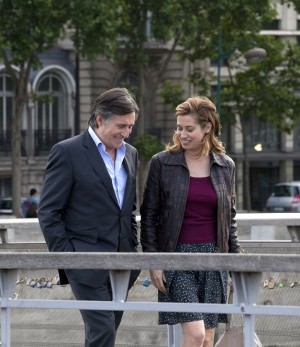Tribeca Talks — Just A Sigh: Romance At First Glance
Infatuation is often unexplainable. It comes and goes as it pleases, often clutching an individual within its powerful grasp without warning, like a spider capturing its prey in its intricately fashioned web. And it is this potently fused feeling of passion, lust and love that is at the heart of the storyline of French filmmaker Jérôme Bonnell’s (The Queen of Clubs, Le chignon d’Olga) fifth full-length feature, Just A Sigh (Le temps de l’aventure), which recently had its international premiere at The Tribeca Film Festival in New York City. Full of little dialogue (apart from the occasional use of Franglais), the film is a journey into the depth of emotions and inward struggles that our two leading characters face in their daily lives, with loneliness being a recurring theme.
We meet the two lost souls, Alix, the thespian, and Douglas, the mysterious stranger (played by Emmanuelle Devos and Gabriel Byrne), on a morning train ride to Paris, with Alix traveling back from Calais for an audition, only to have to return to the same place a few hours later for an evening performance of Henrik Ibsen’s The Lady From the Sea. What follows is a scene in which the viewer immediately senses the tension and curiosity that surrounds the two individuals, as they exchange furtive glances with one another for the entire portion of the train ride. With growing anticipation we wait for them to exchange a few subtle words, and while that moment does finally arrive, it isn’t in the form we had expected, with Douglas asking Alix for directions to the Basilica of St. Clotilde, only to be interrupted by another traveler who proceeds to give Douglas the route he should take. Alix, dissuaded by this sporadic disturbance, leaves without exchanging another word.
However, we soon find out that Alix’s fascination with the man is overpowering, one might even go as far as to say that it is controlling her actions and decisions, as she herself ends up at the Basilica of St. Clotilde, at which the funeral mass for Douglas’ former lover had just taken place. And while one of them has just lost a woman that held their heart, and the other is involved in a long-term relationship with Antoine, a man who we never meet onscreen (voiced by Denis Menichot), their pull toward one another is inevitable, and as such we are witnesses to a beautiful, albeit brief romantic encounter which ignites and dances like a flame on a newly lit candle.
Emmanuelle Devos (Rue Mandar, Coco Before Chanel), who plays the erratic actress, delivers an impeccable performance of a human shadow, following the intricate moves of Douglas with her watchful eye before making her eloquent attempt at seducing him, never faltering in her character’s mood changes or indecisions (not to mention her English spoken lines). Through Devos’ experienced capability of moving swiftly from emotion to emotion, we are able to see the achiness of a heart that craves attention and nurture — things that her real relationship seems to be lacking in. Gabriel Byrne (Vikings, All Things to All Men) on the other hand, who plays the British lover whose listening skills are put to the test, brings to the film an air of elegance and serenity that juxtaposes Devos’ character. And while Alix takes center stage to the film, it is Douglas’ display of sincerity that makes the viewer hope for a particularly idealistic type of ending, even though the real one is left in a veil of vagueness.
Of course that isn’t to say that the film isn’t without its faults, like a lack of exploration between the supporting storyline of Alix and her sister (why is there such hostility amongst the two?), or rather her familial relations, as well as the wavering nature of Alix and her inability to find herself in the place she calls home, but these play merely contextual roles to the story, and therefore, don’t derail the impact that the theme of romance at first glance brings in this dramedy.
On a breezy and sunny afternoon, in close proximity to the Hudson River and the Meatpacking District, I met with Devos and Bonnell in the recently closed restaurant, Merkato 55. They sat together at a round coffee table, patiently seeing one reporter after another, as their public relations team and a camera crew hustled around, laughing and talking about their time at Tribeca. There was a joviality in the air as I approached them, the final interview of the day, and although they must have been exhausted, their welcoming facial expressions didn’t indicate it. Though they spoke in French for the most part, getting their thoughts across with the help of an English translator, there was little awkwardness and a relaxed, classy atmosphere surrounded the table as they spoke of their inspiration, working with actor Gabriel Byrne, and the use of classical music in the film.
GALO: Is the translation of the title of the film from French to English an accurate one or was something possibly lost in its meaning?
Jérôme Bonnell: The original French title was impossible to translate literally because, indeed, when translated into English it would lose a lot of the nuances in the meaning, for all the words. And so, the English title that was chosen is a reference to “As Time Goes By,” [a song from the film Casablanca.]
GALO: The film is saturated in the themes of loneliness, loss and love. What was your inspiration for the film and for the characters?
JB: Well, the very first inspiration was writing a film for [actress] Emmanuelle Devos, and you know, thinking of somebody as you’re writing really gives you ways…and it was a perfect coincidence that I could do that. And coming up with the story itself that was about what love can be like [chuckles], and then turning it into a great love story.
(Interview continued on next page)

